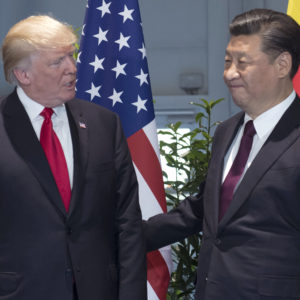WASHINGTON — U.S.-Chinese relations are going from bad to worse amid doubts about China’s real support of sanctions against North Korea and America’s fast worsening trade deficit with China.
The deteriorating U.S.-China relationship was outlined in stark detail at a forum of the Peterson Institute for International Economics at which top experts expressed alarm about what’s happening between Washington and Beijing while North Korea remains the foremost foreign policy problem for President Donald Trump.
“The deficits are large and continue to increase,” said Jeffrey Schott, longtime economist at the Peterson Institute. He predicted “increasingly protective responses” by the Trump administration “as the U.S. ratchets up pressure on North Korea” in view of the North’s refusal to give up its nuclear and missile program.
Schott saw rising problems ahead that link the trade impasse with China to the confrontation with North Korea. “China may not enforce sanctions,” he said, leading to more “restrictions” on commercial relations between the United States and China.
In short, said Schott, summarizing both sides of the problem, “This is a threat not only in trade relations with China but in strategic relations.” There was, he went on, “strong concern about the overall relationship” covering “not only political but strategic issues.”
The difficulties with China are most alarming considering they are sure to have repercussions not only for bringing serious pressure on North Korea but also for challenging China’s rising influence all around Asia from the East China Sea to the South China Sea to Pakistan, the largest recipient of Chinese military aid.
As the U.S. tries to make a dent in China’s rising trade surplus, so American armed forces and diplomats are defying China’s claim to the entire South China Sea and trying to get Pakistan to stop providing safe haven for hostile forces in neighboring Afghanistan.
China meanwhile is conducting its “one-belt, one-road initiative” in which it’s built a highway across the Himalayas into Pakistan in order to provide a route to the port of Gwadar on the Pakistan coast. It is an incredible project, costing more than $50 billion, that extends China’s power to the Indian subcontinent where Pakistan and India are historic foes, both armed with nuclear weapons.
The phenomenon of rising Chinese power has tremendous implications in which no happy solution is in sight. The numbers help tell the story. China accounts for nearly half the growing U.S. global trade deficit of nearly $800 billion, a figure that compares with the U.S. deficit with Japan last year of more than $80 billion and the deficit with South Korea of more than $30 billion.
At the same time, according to Gary Hufbauer, a senior fellow at the Peterson Institute, the Americans are increasingly concerned about Chinese investment in American companies. It’s not just the fear of Chinese takeover of vital industries that’s causing alarm. It’s the fear that the Chinese will acquire technological secrets that they would never be able to match if they did not have the inside track into all the research and development carried out by brilliant American scientists, physicists and engineers.
“Chinese investments are getting heavy scrutiny by (the Committee on Foreign Investment in the U.S.) due to security concerns,” Hufbauer said. It was for that reason, he noted, that Trump blocked a proposal by China Venture Capital to pay $1.3 billion for the acquisition of Lattice Semiconductors.”
What if China acquired a huge stake in Google, the giant on which the world depends to look up just about anything and everything. “Google has the technology for military and civilian use,” Hufbauer said. “We shouldn’t let the Chinese catch up with us.” Just about every proposal, he went on, “should be subject to very intensive review.”
Hufbauer said Trump has the authority to demand tight screening, and block transactions, under current law but is likely to get still greater power over foreign investment as a result of a bill now before the U.S. Congress. He added that the bill, unlike other contentious legislation, has bipartisan support from both Republicans and Democrats in Congress.
“The Democrats are just as hawkish as the Republicans,” Hufbauer said, noting that important Democratic senators support tough standards on foreign investment even though they oppose Trump on other legislation.
The Chinese, moreover, are if anything tougher on U.S. investment than are the Americans on Chinese investment in the United States. “A lot of sectors in China are closed,” Hufbauer said. “They’re tightening up,” he said, citing “overwhelming attempts to put up barriers.”
One especially significant product is steel. Chinese production of steel has increased from 34 percent of the world market in 2006 to 49 percent in 2016 while steel output has also increased in Brazil, India and, of course, South Korea.
“The outlook for trade relations is not good,” said Schott, the Peterson economist. “We have to find a way to reverse it.” Although pessimistic about bilateral talks between Washington and Beijing, he expressed the hope that multilateral negotiations under the aegis of the World Trade Organization might be more effective.
The repercussions of the standoff, however, promise to be widespread. The United States also has to worry about military treaty alliances with allies such as South Korea, which might well object to tough U.S. action on the trade deficit while both the United States and South Korea confront a nuclear-armed North Korea.
“We have to be sensitive about the impact on cooperation in the region,” Schott said.
Hufbauer echoed this view. “Other countries exporting steel to us are U.S. allies. You have substantial allied problems.”

